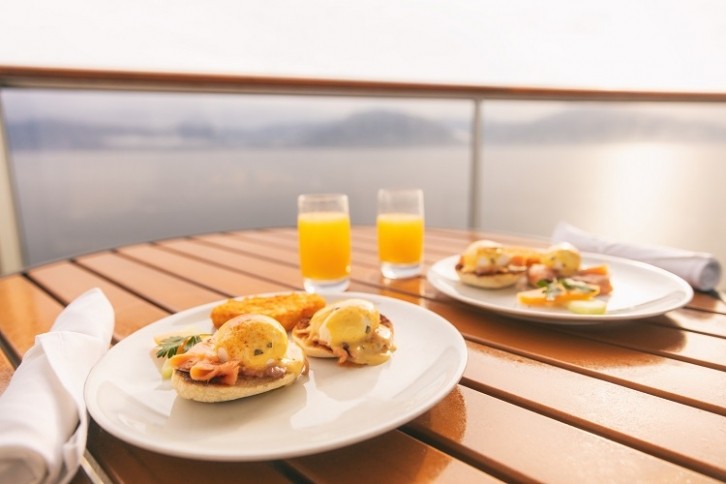The cruise industry is not exactly famed for its eco-friendly credentials. In fact, it’s more likely to be associated with environmentally damaging behaviours, such as causing damage to coral reefs and influencing the migratory patterns of marine wildlife. However, the industry appears to be improving its approach to the environment, starting with food waste.
How is the cruise industry reducing food waste?
There appears to be a concerted effort by the cruise industry to improve its carbon footprint and reducing food waste is an important part of that effort.
A veritable giant of the cruise industry, Royal Caribbean, has developed a platform to monitor food supply and closely estimate exactly how much food should be produced, prepped and ordered on any given day. It’s also implementing artificial intelligence (AI) to adjust food production in real time, tracking guest demand for specific menu items and adjusting menu preparation and ordering accordingly, with an aim of reducing food waste across its entire fleet by 50% by 2025. It’s also partnering with the World Wildlife Fund (WWF) to introduce a food waste awareness campaign in the crew dining areas fleetwide.
But that’s not the most interesting part. Royal Caribbean is also turning food waste into energy. The line’s newest ships will convert solid waste directly into energy on board.
“Pioneering the first waste-to-energy system on a cruise ship builds on our track record of waste management and furthers our commitment to remove waste from local landfills.”
The systems, Microwave-Assisted Pyrolysis (MAP) and Micro Auto Gasification (MAG), takes waste on board and converts it into synthesis gas (syngas) that the ship can directly use as energy, similar to land-based waste-to-energy facilities.
“I am proud of Royal Caribbean Group’s drive to SEA the Future and be better tomorrow than we are today,” said Jason Liberty, president and CEO of Royal Caribbean Group. “Pioneering the first waste-to-energy system on a cruise ship builds on our track record of waste management and furthers our commitment to remove waste from local landfills.”
And Royal Caribbean is not the only cruise line putting eco-friendly practices on the agenda. P&O Cruises is also setting targets for reducing food waste.
“Thanks to the concerted dedication of our onboard food and beverage teams, we proudly achieved and surpassed our 2022 goal to reduce food waste per person by 30%,” a spokesperson for P&O Cruises told FoodNavigator. “We established a new goal of a 40% reduction by 2025 and a 50% reduction by 2030 relative to our 2019 baseline.”
Like Royal Caribbean, P&O Cruises is also turning to technology to responsibly manage the food waste it does produce, helping to avoid a reliance on sending the waste to landfill at ports visited or worse, dumping the waste at sea.
“The safe management of food waste is a key component in our ongoing commitment to reducing our impact on the oceans we sail. One way in which we ensure the efficient management of food waste is through investments in technology such as biodigesters and dehydrators,” a spokesperson for P&O Cruises explained to FoodNavigator.
Food waste biodigester technology uses a natural aerobic digestion process inside each machine to efficiently break down food waste, utilising a mix of beneficial microorganisms. Biodigesters reduce the amount of methane and carbon dioxide emitted into the atmosphere while also reducing the demand on the ocean for complete food waste decomposition.
Operating 24 hours per day, the biodigesters also collect plastic and other inorganic materials, preventing them from being discarded overboard. Food waste dehydrators are then used to remove water content from the food waste, reducing its volume by approximately 90%. Dehydrators produce a mostly dry inert biomass output, which is offloaded when the ship reaches port or incinerated on board.
Princess Cruises is another line to implement the use of biodigesters in their food waste.
“Food is a big deal on a ship and we’re focussed on minimising any food waste,” explained John Padgett, President of Princess Cruises. “We’re accelerating the natural biological process with this technology and so any of the biproduct has a lower impact on the overall ecosystem. And we’re measuring ever bit of it because we weighed it and so now we know the overall waste per guest on a ship and we have all types of initiatives that continue to focus on lowering that waste.”

Can food manufacturers learn from the cruise industry about reducing food waste?
Though they are arguably late to the game when it comes to eco-conscious behaviours, the cruise industry is now not only taking the issue seriously but investing heavily in technologies to tackle it. And those technologies could certainly be used by food manufacturers in dealing with food waste.
Where the cruise industry uses AI to track guest demand for specific menu items and adjust preparations accordingly, food manufacturers could perhaps look at consumer demand through sales and produce food products accordingly, thus avoiding overproduction.
However, in instances when food is overproduced, the resulting waste could potentially be converted back into energy, using systems similar to the Microwave-Assisted Pyrolysis (MAP) and Micro Auto Gasification (MAG) systems used by Royal Caribbean. That energy could then be funnelled back into future food production.
Food manufacturers could also use biodigesters and dehydrators to reduce methane and carbon dioxide emissions when disposing of any food waste produced. In fact, some food and beverage manufacturers are already using the same or similar technologies, with PepsiCo using biodigesters and certain supermarkets, such as Hoogvliet in the Netherlands, using AI to monitor food sales and drop the price of foods that are nearing their expiration date.
